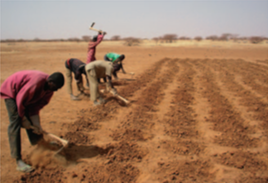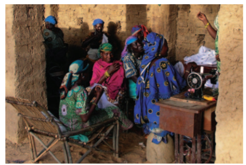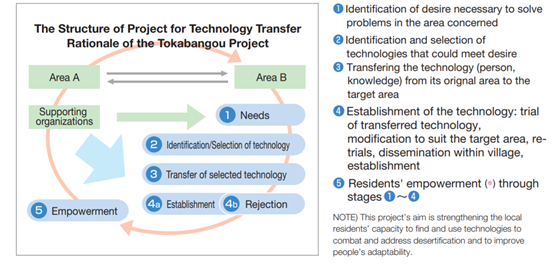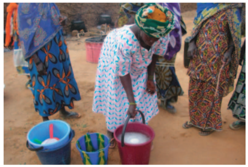#Combatting Desertification, #Traditional Technology, #Participatory Development
Project Overview
Utilisation of traditional knowledge and existing technology is important and effective for combatting desertification

Local farmers digging Zai, a traditional land rehabilitation technology
(Source: Ministry of the Environment, Japan)
What are the roles of modern technologies and indigenous knowledge for addressing issues in developing countries? Some people may think that if you only have modern technologies, the problems would be solved without indigenous knowledge. Actually, that is a misconception. There have been cases in developing countries where new and advanced technologies were introduced but not sustainably maintained and thus the matter remained as it was. This fact demonstrates that modern technology alone does not always provide a fundamental solution to solve challenges in developing countries. Under this backdrop, traditional knowledge had attracted attention as alternative or supplemental solutions.
Traditional knowledge and technologies which have been fostered through trial and error over generations are assets in communities. They are easy to maintain, materials needed to operate them are available, and have the potential to be applied to other areas in a similar environment. For this reason, the Ministry of the Environment, Japan implemented a pilot project for transferring traditional knowledge and technology from 2004 to 2007 in Tokabangou village, Burkina Faso. During the project, traditional knowledge and technologies that have been utilised against desertification in neighbouring areas were identified, and four of them were selected and transferred to the residents of the target village. The lessons learned from the experience were summarised in the pamphlets introduced at the end of this article.
Project Details
1. Outline of the pilot project

Sewing workshops were hold for technology transfer.
(Source: Ministry of the Environment, Japan)
A target site of the pilot project was Tokabangou village, Burkina Faso, which has been facing the challenge of desertification. In the past, technology transfer was often done by people from developed countries where the technology was established, introducing this to developing countries where the technology was believed to be needed. However, under the project, the selection of the technology was conducted by the local residents themselves and not by outsiders. These selected technologies were, then, transferred from original areas to the target areas and modified to suit them.

The Framework of the Pilot Project (Source: Ministry of the Environment, Japan)
Au cours du projet, différents savoirs, techniques et pratiques traditionnels utilisés pour lutter contre la désertification et la dégradation des terres dans les régions voisines ont été identifiés. Parmi ces savoir-faire traditionnels, les résidents locaux ont choisi les pratiques ou techniques suivantes comme étant celles qu’ils désireraient apprendre : le zaï, une technique traditionnelle de réhabilitation des terres, l’élevage, la fabrication de savon et la couture. Des ateliers visant à transférer les pratiques sélectionnées aux résidents locaux ont été organisés au cours du projet.
2. Enseignements tirés du projet

Soap-making group
(Source: Ministry of the Environment, Japan)
(i) Mesures complémentaires aux processus traditionnels de prise de décision
In order to secure ownership, it is important that the local residents are encouraged to identify and select the technologies themselves through traditional decision-making processes. In Tokabangou village, decision-making had been generally done during gatherings after prayers at the mosque. In the gatherings, older villagers’ opinions had tended to be given priority, and women had been basically excluded from the processes. Therefore, during the project, aiming to involve women in the decision-making process, women’s meetings were held in parallel with men’s plenary meetings during the project.
(ii) Review and evaluation of preceding groups
It is important to review and evaluate the groups who introduced useful technologies ahead of other groups. The result will be used in deciding whether to suspend, continue or expand the transfer of the introduced technologies. Also, it is necessary to prevent monopolising of profits or benefits by leading groups, or those who introduced new technologies faster than other groups.
(iii) Improvement of technologies based on the local environment
Sometimes, it is needed to improve technologies in accordance with the physical and socioeconomic conditions of the local environment. Otherwise, newly introduced technologies will not make the expected impacts.
(iv)Cooperation with other organisations and mainstreaming policy
Cooperation with other international organisations, including NGOs, is a way to achieve sustainable dissemination of useful technologies. Also, it is important to encourage national/local governments to mainstream relevant activities or technical trainings to combat desertification.
For further information, please consult the manuals and reports
The guides, manuals and tools produced within the framework of the project which can be used for training, scaling up and awareness raising can be downloaded from the links below. The approach can be applied to other countries in arid or semi-arid areas.
Written by Ayaha Mochizuki,
AI-CD Secretariat Support Team

